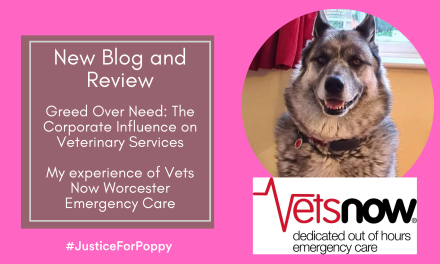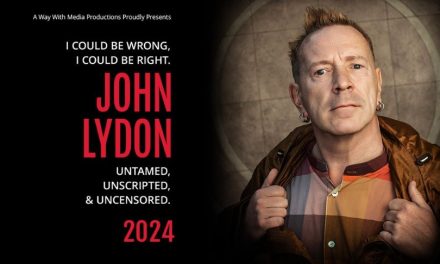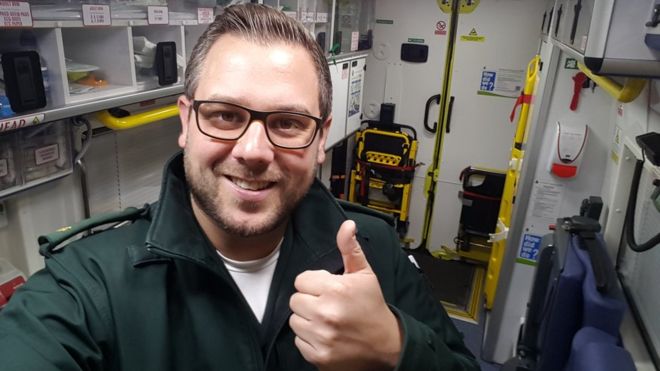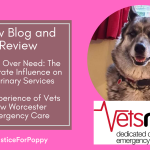Some of you who read my blog will remember this post which was an open letter to the West Midlands Ambulance Service and Worcestershire Acute NHS Hospitals Trust thanking both organisations and everyone involved in them for everything they did to look after my Dad when he was taken into hospital recently.
So it came as a huge shock when I read a story in the press recently about a chap in Birmingham who left this note on the windscreen of an ambulance while paramedics were attending to a critically ill patient. They had to park the ambulance across this chap’s drive:
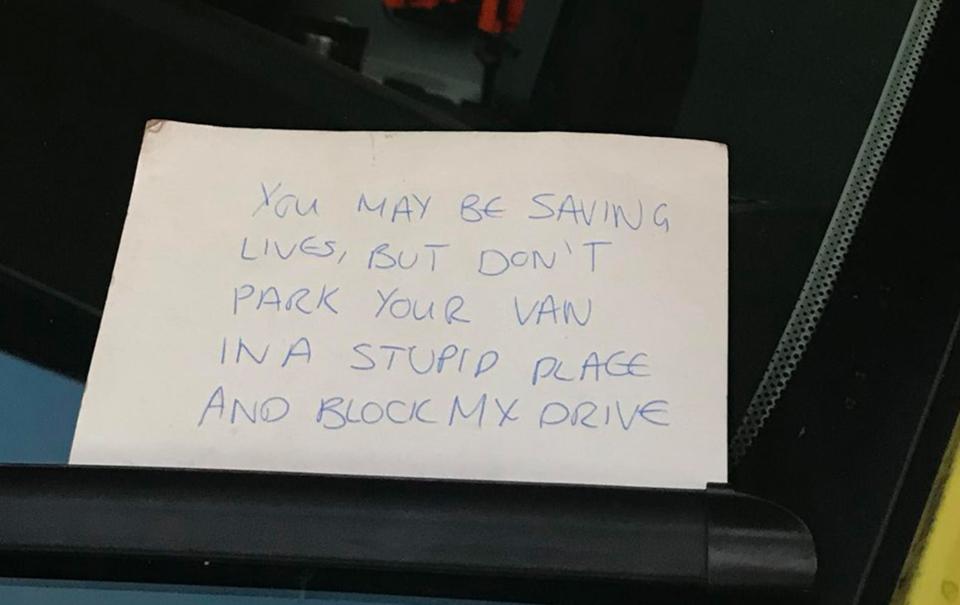
The nation was absolutely incensed by this note, after all, the paramedics were only doing their job! Sadly the person they were attending to who was taken critically ill subsequently died.
This news story brought the work of the emergency services and paramedics into the media spotlight, with many coming forward to praise them for all their hard work and everything they do to save lives. But for every good story there were lots of stories about people being abusive and nasty to paramedics.
Rob Moore, a paramedic working for West Midlands Ambulance Service, decided that he wanted to give his colleagues a big morale boost and started an online campaign to get people talking about the positive and happy experiences they have had with paramedics. Called #BlueLightHappy, within a couple of days Rob’s campaign went viral and trended on Twitter with many people sharing good news stories and their positive encounters with paramedics across the UK.
Due to my recent experience and encounter with the West Midlands Ambulance Service and being forever in their debt for their help in saving my Dad’s life the story about “Notegate” angered me to the core, with Rob’s #BlueLightHappy campaign having the opposite effect of making me feel proud, positive and happy that we have a strong paramedic workforce who are always there to do whatever they can to save lives. I was therefore absolutely delighted when after tweeting with Rob he agreed to give an interview for “Cyber Geek Girl” about his #BlueLightHappy campaign.
Over to you Rob!
Tell us a bit about yourself, your background and what you do.
My name is Rob Moore and I’m a paramedic working in Birmingham for West Midlands Ambulance Service. I’ve worked there for just over four years now, starting as a student paramedic and qualifying as a paramedic in September 2015. I live in Great Barr, but I’m not native to the West Midlands, having grown up in Nottingham and Derbyshire. However, I’ve been in Brum ten years now, and I consider it my home.
What did you think when you heard about the note that had been left on an ambulance by Hassan Shabbir while paramedics were attending to a critically ill patient?
My biggest reaction was disappointment – it came at a time when negative behaviour towards us seems to be increasing. However, reading of his apology, and using the events as a catalyst to start #BlueLightHappy, I feel like the event has actually become a motivation for others to think about doing something good.
What inspired you to start your #BlueLightHappy campaign?
The above! And all of the other stories. It was beginning to look like a rather bleak picture for us, but I remembered that with every negative story, we’d be met with reactions from the public like “We don’t all feel that way” and “Most of us love you!”. I figured it would be great to give this majority a platform to share their appreciation of us, and for my colleagues to be able to see it all in one place.
You’ve received quite a bit of national attention for your #BlueLightHappy campaign, how has it gone for you so far?
In one word: phenomenal. The reach has been amazing, and although it’s been very tiring spending a lot of time talking about it, I realise that I’m in a privileged position to have that voice, and want to ensure that as many people as possible can hear about #BlueLightHappy and maybe even share their own stories. The whole thing has been quite humbling, and I’m SO proud of it.
Did you expect the #BlueLightHappy campaign to go viral and get the national press attention that it has had so far?
I could never have imagined quite how far it could reach. On Tuesday evening I set out for an evening walk, with no extraordinary plans for the next day, and by the time I got home I was packing a bag to get to London to appear live on Good Morning Britain to talk about it the next morning! From that, to seeing it trend on Twitter, and getting it noticed by the Health Secretary, it’s really demonstrated the power of social media.
What sort of statistics have you had for your #BlueLightHappy campaign to date?
My initial #BlueLightHappy tweet has appeared on screens 51,000 times so far, and a photo of a really supportive note that had been left on an ambulance has been seen over 100,000 times, which is a staggering number of people!
Have there been any participants in #BlueLightHappy that have stood out for you?
There are two that stick out for me, both because they’re personal. A lady contacted me whose dad I’d transferred between two hospitals for treatment, to tell me how much easier their experience was thanks to my warmth and compassion. And another chap contacted me after seeing me on the TV, to thank me for getting his partner to hospital last week. He said I’d “literally saved his life”, and that’s the best feeling ever in this job.
That said, every single #BlueLightHappy tweet I’ve read has touched my heart, because they’re all so genuine and moving. We’re like one big family in the emergency services, so good deeds for my colleagues are like good deeds for us all.
What is the most rewarding thing about being a paramedic for you?
Most of us will tell you that it’s helping people, in any way. I love being able to arrive at a call, and take the situation from one of fear, anxiety, distress or unhappiness to something much more positive. Sometimes that’s through medical interventions and drugs, and sometimes it’s just simple reassurance, and a good sense of humour. Coming away from my working day knowing that I’ve done something good for someone is why I turn uo the next day.
What is the most harrowing thing or things you’ve seen being a paramedic and how do you deal with them?
I’ve seen things that most people won’t ever see. A fair few dead bodies, limbs torn from bodies, people who’ve neglected themselves to the point of serious illness. The stuff that has the biggest impact for me is the human side. If I deal with a deceased patient, it’s usually less the dead body that gets to me, but the reactions and emotions of a grieving relative. I can stop major bleeding, I can relieve pain and I can give people oxygen if they don’t have enough. But I can’t say anything to a bereaved person that will change what’s happened, and that chokes me up every time.
We have to be little brutal with ourselves in this job, and leave each patient at work instead of taking work home with us. Whilst our warmth and compassion is genuine, I treat every patient as “just another patient”, which sound harsh, but it’s how I deal with it. If I got attached to them, I wouldn’t be able to do the job.
Could you tell us about one of the best highlights of your career as a paramedic to date?
I think it has to be #BlueLightHappy! To have had such a positive impact on SO many people is just incredible, and it’s even made me happier at work, I find myself being much more aware of the positive stuff that people say to us.
Is there anything else you would like to share about your experiences as a paramedic?
I really do think it’s the best job in the world, and I wouldn’t want to be doing anything else!
Thank you Rob for this brilliant interview and for instigating the #BlueLightHappy campaign!

